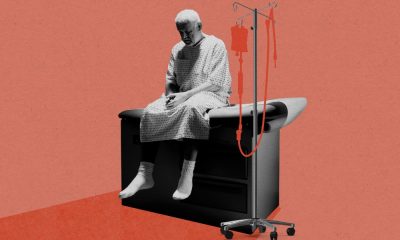Health
Chicago Healthcare Law: Compliance and Regulations for Medical Professionals
Published
11 months agoon
By
Terry Power
As a medical professional in the vibrant city of Chicago, providing quality healthcare services to patients is undoubtedly your top priority. However, staying well-versed in the ever-evolving landscape of compliance and regulations is essential alongside the noble pursuit of healing. Understanding and adhering to the legal requirements specific to the healthcare industry in Chicago is crucial to ensuring the well-being of your practice and your patients.
Pixabay
The healthcare industry is one of the country’s most regulated markets, making medical compliance a vital and expanding field. Some neighborhoods of Chicago are recognized by the state, federal, and commercial dealers as hotbeds for non-compliant healthcare services and transactions. These organizations operate an unsustainable business model that greatly risks the lives of their patients. However, non-compliance can sometimes occur due to procedural issues or paperwork errors.
This blog broadly covers the key legislation that all practitioners should know and the potential consequences of default. Whether you are a seasoned practitioner or just starting your medical journey, this guide aims to equip you with the knowledge to navigate the complex world of healthcare compliance confidently. If your organization requires more clarity on healthcare compliance, contact attorneys specializing in this domain via this website. They can help guide you through the nuances of the law and pitfalls to avoid.
What is Healthcare Compliance?
Healthcare compliance refers to state and federal regulations that dictate privacy and usage guides for patient data, ensure superb patient care, prevent malpractice, and protect healthcare workers.
It encompasses a system of policies, training, and processes that adhere to government healthcare laws. All Medicare/Medicaid providers, equipment suppliers, and commercial healthcare insurers must provide high-quality services as expected from an average person or entity in the same position.
Some of the most well-known acts, regulations, and laws that healthcare providers need to observe include:
Safeguarding Privacy
Privacy of patient data is a requirement of the Healthcare Information Portability and Accountability Act, aka HIPAA. The act requires healthcare providers to protect and handle patient medical data with care so they don’t end up in the hands of malicious persons and entities. The inspector general’s Office in the Department of Health and Human Services is the federal wing in charge of ensuring all health practitioners observe this law.
The HITECH Act, aka Health Information Technology for Economic and Clinical Health Act, encourages the standardization of patients’ electronic health records. The law directs the federal Health and Human Services (HHS) Office for Civil Rights to perform regular provider audits and penalize patient data breaches to $1.5 million.
Ensuring Quality Care
Regarding quality healthcare, the Emergency Medical Treatment and Labor Act, aka EMTALA, requires Medicare-affiliated facilities that provide emergency services to give medical examination and stabilizing care to patients needing emergency medical help regardless of insurance limit or economic level.
Furthermore, the 2010 Affordable Care Act brought essential, subsidized healthcare to Americans. It required healthcare practitioners to dovetail patient care services within a network of physicians and hospitals to keep costs low and improve quality of services.
Penalties and Potential Consequences of Healthcare Non-Compliance
In Chicago, healthcare organizations that fail to comply with the relevant regulations and requirements can face various penalties and consequences. It’s important to note that specific penalties may vary depending on the nature and severity of the non-compliance. Regulatory bodies, such as the Illinois Department of Public Health (IDPH) or the Office for Civil Rights (OCR), can impose monetary penalties on non-compliant healthcare organizations.
Further, individuals and organizations may face license suspension or revocation for serious and repeated violations. This penalty can result in the temporary or permanent closure of the facility or the blacklisting of practitioners. Non-compliant organizations may be excluded from participating in government healthcare programs like Medicare or Medicaid. This exclusion can severely impact the organization’s ability to provide care and receive reimbursement for services rendered to program beneficiaries.
Patients or other affected parties will likely file lawsuits seeking damages resulting from non-compliance, privacy breaches, medical negligence, or other violations. This will have a direct fiscal impact on the organization.
Negative publicity, loss of patient trust, and damage to the organization’s brand can have long-lasting effects on its viability and success. Regulatory bodies may require non-compliant organizations to implement corrective action plans, which involve addressing the identified violations, implementing necessary changes, and demonstrating ongoing compliance.
Government agencies have recently started pursuing and bringing charges against fraudulent and non-compliant healthcare providers. For example, a local healthcare technology outfit was recently discovered to be involved in a billion-dollar fraud scheme leading to the prosecution and charging of two ex-employees and four executives.
In another landmark case,charges were successfully brought upon four women for defrauding the state Child Care Assistance Program of a million dollars in fraudulent claims.
Some of the penalties for non-compliant practices include:
- Criminal arraignment
- Revocation or suspension of medical license
- Monetary fines
- Exclusion from state Medicaid projects
- Termination of hospital privileges
- Denial of federal contracts
How a Chicago Healthcare Compliance Lawyer Help
Attorneys with practice in healthcare compliance laws and regulations can help you set up a proper compliance program for your practice. A genuine compliance program protects your staff and practice from civil, criminal, and administrative penalties from the state and federal government. It also protects your practice from payment scrutiny and banishment from healthcare provider networks.
A good attorney will work with your practice to establish or update your healthcare compliance solutions and train the staff to ensure compliant practices. When staff knows what is reasonably expected from someone in their position, they can work to reduce or prevent billing mistakes, fraudulent or erroneous claims, and transaction audits.
In case you get sued, an attorney will also provide representation. They will leverage their background in healthcare compliance laws, formulating solid defenses, and fighting for a better outcome.
Published by Medicaldaily.com
You may like
-


A chemo drug storage shows the vulnerability of the healthcare supply chains
-


The Download: medical ethics, and AI watermarks
-


Who gets to decide who receives experimental medical treatments?
-


The Download: China’s semiconductor fightback, and New York’s controversial AI law
-


The Download: China’s semiconductor fightback, and New York’s controversial AI law
-


Why everyone is mad about New York’s AI hiring law
Health
Feeling Tired All The Time? Possible Causes And Solutions
Published
11 months agoon
22 June 2023By
Terry Power
Long days of work, lack of sleep, and stress at the office can be the most common factors that make you feel tired. However, feeling “tired all the time” (TATT) without known reasons can be an indication of an underlying health issue that needs immediate attention.
Finding the exact cause of the lingering tiredness can be the first step toward solving the symptom.
Health conditions that cause fatigue:
1. Anemia – Anemia is one of the most common causes of fatigue. A person who has anemia does not have enough red blood cells in the body, causing symptoms such as tiredness, dizziness, feeling cold and crankiness.
Most often, anemia is caused by iron deficiency. Hence, the condition can be best resolved by including iron-rich foods in the diet and use of iron supplements.
2. Sleep Apnea – It causes the body to stop breathing momentarily during sleep. The condition can affect the quality of sleep and hence make you feel fatigued.
For milder cases of sleep apnea, lifestyle changes such as losing weight or quitting smoking can help solve the sleep disorder. In more severe cases where there is an obstruction in breathing, surgeries and therapies can help.
3. Diabetes – A person who has diabetes has changes in blood sugar level, which can cause fatigue. A patient who is already on diabetic medication can also experience tiredness as a side effect of the medication.
Early identification and taking the correct treatment is the key to managing diabetes. Losing extra weight and having a healthy diet also help in the treatment.
4. Thyroid – Thyroid diseases can be due to an overactive or an underactive thyroid gland. In people who have an underactive thyroid (hypothyroidism), the metabolism slows down leading to symptoms such as lethargy and fatigue. In people with an overactive thyroid (hyperthyroidism), the metabolism speeds up leading to fatigue and difficulty sleeping.
Right diet and lifestyle choices, along with medications, can help in thyroid management.
5. Infections – A person can show symptoms of fatigue when the body is fighting a viral or bacterial infection. Infections ranging from the flu to HIV can cause tiredness.
Along with fatigue, other symptoms such as fever, headache, body aches, shortness of breath and appetite loss can also accompany the infection. Treating the symptoms and taking adequate rest helps in faster recovery.
6. Food allergies – Fatigue may be an early warning sign of hidden food allergies and autoimmune disorders such as celiac disease. Identifying the allergen using a food allergy test or through an elimination diet can help in allergy treatment.
7. Heart disease – If you feel exhausted from an activity that used to be easy, then it is good to check your heart health, as fatigue can be an indication of underlying heart disease.
8. Depression/ anxiety – Fatigue can also be an indicator of a mental health disorder such as depression or anxiety. A combination of medication and psychotherapy can help relieve symptoms.
Lifestyle causes
Apart from serious health conditions, certain lifestyle habits such as dehydration, poor diet, stress and insufficient sleep can cause exhaustion. Having a well-balanced diet, regular exercise and routine sleep can help solve fatigue caused by lifestyle habits.
Published by Medicaldaily.com
Health
How To Overcome Your Sleep Debt And Reclaim Energy
Published
11 months agoon
22 June 2023By
Terry Power
Picture this: you’re burning the midnight oil, studying or binge-watching your favorite shows, all at the expense of a good night’s sleep. Have you ever stopped to think about the toll it takes on your body and mind? The consequences can be more serious than you might realize.
Not getting enough sleep can translate into a multitude of issues, including weight gain, lack of focus, tiredness, a haze of confusion, and even depression. If you too are encountering similar issues lately then chances are you have a sleep debt.
Wondering what is sleep debt?
People from 13-18 years of age need 8 hours of sleep, whilst adults beyond that age will require at least 7 hours of snooze.
Sleep debt is a collection of the total hours you haven’t slept or traded your sleep for something else. Sleep debt keeps piling up as a person falls short of the total hours of sleep recommended for an adult, according to the Centers for Disease Control and Prevention.
And when you keep letting go of your sleep for other activities, the body adapts to the new normal and effects start to reflect on the energy levels, which deplete.
“However, like every other debt out there, this too has a repayment option,” Dr. Kunal Kumar, medical director of the Sleep Center at Einstein Medical Center in Philadelphia, told Livestrong.
Below are some expert-vetted ways you can pay back the sleep debt. (Courtesy: Livestrong and Sleepfoundation)
Just like financial debt, imagine sleep debt as a debt you owe to your body. It needs to be repaid. The good news is that catching up on sleep is indeed possible.
- Maintain a set sleep schedule: Overhauling the sleep schedule is a pretty difficult task to achieve, and it’s best to do that gradually. Create a set sleep schedule by making some small changes to your routine. Instead of making abrupt shifts in your bedtime or wake-up time, adjust them gradually by 15 to 30-minute increments.
- Minimize your gadget usage: Wind down activities and minimize electronic usage before bed to promote better sleep. Relax and prepare for quality sleep by dimming the lights and setting an alarm for 30 minutes to an hour before bed.
- Reshuffle your sleeping arrangements: Are you finding it hard to get a good night’s sleep due to excessive sweating? Well, here’s a handy solution: consider upgrading to a cooling mattress or opting for cooling sheets. These innovative sleep essentials can help regulate your body temperature, and keep you comfortably cool throughout the night, ensuring a more blissful slumber. Memory foam pillows can work wonders in relieving neck and back discomfort in case you are struggling with backache.
- Improve the bedroom environment: Create a sleep-friendly bedroom environment by adjusting the temperature for comfort, and blocking out disruptive lights, or noises that might disturb your restful slumber. And if your mattress, pillow, or sheets are worn out or no longer providing the support you need, consider treating yourself to new ones.
Published by Medicaldaily.com
Health
Omega-3 Fatty Acids Slow The Progression Of Amyotrophic Lateral Sclerosis: Study
Published
11 months agoon
22 June 2023By
Terry Power
Omega-3 fatty acids are known for a range of health benefits, from promoting brain and heart health to reducing inflammation and protection against several chronic conditions.
In a new study, researchers found that omega-3 acids, especially the type found in foods like flaxseeds, walnuts, chia seeds, canola oil and soybean oil, can slow down the progression of amyotrophic lateral sclerosis (ALS).
It is a debilitating nervous system disease that gradually worsens over time and can be fatal. The condition results in a loss of muscle control and affects the nerve cells in the brain and spinal cord. It is also known as Lou Gehrig’s disease after the baseball player who was diagnosed with it.
The initial symptoms of the disease include muscle weakness, difficulty in walking and hand movements. The symptoms can slowly progress to difficulties with chewing, swallowing, speaking and breathing.
The exact cause of ALS is not known. However, around 10% of people get it from a risk gene passed down from a family member. It is estimated that more than 32,000 people in the U.S. live with the condition.
In the latest study, researchers from Harvard T.H. Chan School of Public Health in Massachusetts evaluated 449 people living with ALS in a clinical trial. The team assessed the severity of their symptoms, the progression of their disease, along with the levels of omega-3 fatty acids in their blood, for 18 months.
The study suggested that alpha-linolenic acid (ALA), a type of omega-3 found in plants, is particularly beneficial in slowing the progression of ALS. The participants with the highest levels of ALA had a 50% reduced risk of death during the study period compared to those with the lowest levels of ALA.
Researchers also found a reduction in death risk in participants who had eicosapentaenoic acid, the type of omega-3 fatty acid found in fatty fish and fish oil, and linoleic acid found in vegetable oils, nuts and seeds.
A previous study conducted by the same team suggested that a diet high in ALA and higher blood levels of the nutrient could reduce the risk of developing the condition.
“In this study, we found that among people living with ALS, higher blood levels of ALA were also associated with a slower disease progression and a lower risk of death within the study period. These findings, along with our previous research suggest that this fatty acid may have neuroprotective effects that could benefit people with ALS,” said Kjetil Bjornevik, the lead author of the study.
Published by Medicaldaily.com
